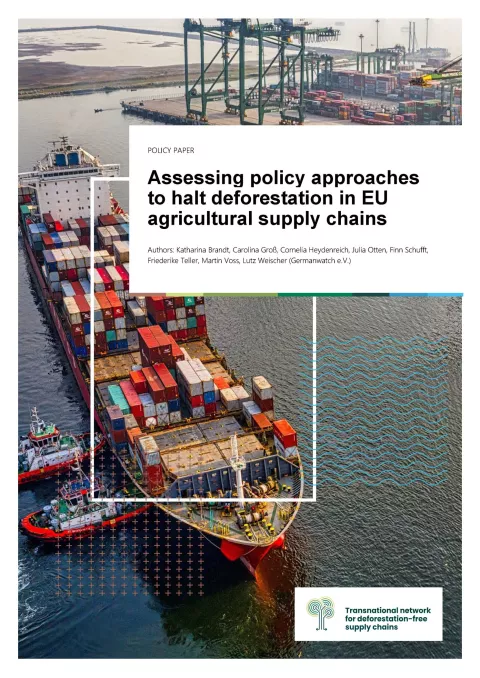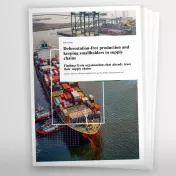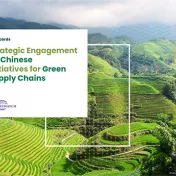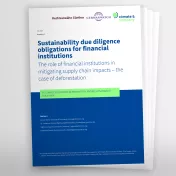
If we want to keep global warming to 1.5°C above preindustrial levels, we have to protect the world's forests. They are an essential carbon sink, provide habitat to over 80 per cent of the world’s terrestrial biodiversity, and the livelihood of millions of people, especially Indigenous communities, depends on forests. However, global deforestation continues at an alarming rate, accelerating species extinction and climate change and threatening human rights. Global trade in agricultural commodities is a major driver of deforestation. As the world’s second largest importer of forest-risk commodities (FRCs), the EU’s responsibility is to avoid deforestation in its supply chains. The EU is currently discussing various approaches to do so.
In this publication, we have analysed, compared and evaluated five different approaches. These include the EU Regulation on deforestation-free products, the EU Sustainable Corporate Governance initiative, reform of EU trade agreements, Sustainable finance and voluntary corporate commitments. To identify Strengths, Weaknesses, Opportunities and Threats (SWOT) of each approach, we have conducted expert interviews as well as an extensive literature review.
Our analysis finds that to varying extents, all options can contribute to reducing EU-driven deforestation. Voluntary corporate commitments as they exist today are not sufficient to address the problem. The EU should pursue a combination of several more binding approaches to address both the specific problem of imports linked to deforestation as well as the broader systemic drivers of corporate responsibility, finance and trade. While the EU Regulation on deforestation-free products appears to have the potential to be the most effective in preventing deforestation linked to the importation of specific high-risk products, the current legislative proposal contains several loopholes that would significantly reduce its effectiveness.
A strong EU legislation on environmental and human rights due diligence is needed to complement the product-specific approach of the Regulation on deforestation-free products. Through comprehensive sustainable finance frameworks, the EU should also contribute to a shift of international financial flows away from activities that drive deforestation and towards more sustainable land-use. EU trade agreements could contribute to reducing deforestation if they are reformed to include enforcement mechanisms that ensure compliance with environmental and labour commitments. Furthermore, EU action should be embedded in a cooperative international strategy that engages producer countries as well as other large consumer markets.








